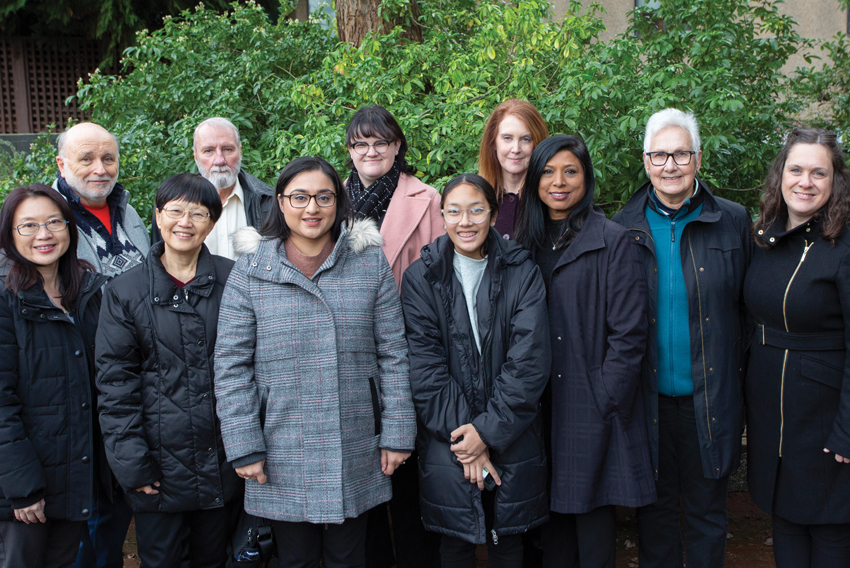Reprinted from the Recovery: Living Your Bestish Life issue of Visions Journal, 2022, 17 (4), pp. 16-17

We all forget things, experience changes in our mood or mix up our words from time to time. When it starts to have a significant impact on our day-to-day lives, it may be dementia, a medical condition currently affecting thousands of people across BC.
Dementia is a broad term for a set of symptoms that includes memory loss, changes in mood and difficulties with thinking, problem solving and language. Dementia is caused when the brain is damaged by disease, most notably Alzheimer’s disease. While many people associate dementia with old age, it is not a natural part of aging and can affect people as young as 40.
Receiving a diagnosis of dementia is life-changing. When people living with the disease and their caregivers and family members have the right information and support, they can better understand the diagnosis and be better equipped to cope with the changes to come.This helps people be as prepared as possible so that they can make health and lifestyle changes that may slow the progression of the disease, live as well as possible and set out legal and financial matters while they can clearly articulate their wishes.
Dementia is a progressive and ultimately terminal illness. The symptoms may seem small at first, but eventually they begin to affect day-to-day life. Dementia impacts each person differently, with symptoms and rate of progression varying from person to person. However, the diseases typically follows a set of stages that coincide with different changes to a person’s abilities:
Early stages: In these stages common symptoms include forgetfulness, difficulty learning new things or following conversations, issues with concentration and rapid changes in mood. These symptoms may seem manageable at first, and often the person can still maintain their independence with support. A person may have insight into their changing abilities and may be able to inform others of their experiences and take steps to plan for the future.
Middle stages: As the disease progresses to the middle stages, people experience a greater decline in their abilities. For many, this is the longest stage. Both the person living with dementia and their caregivers will need help and support. Memory loss will become even more of a challenge. This is the phase when families consider long-term care for the first time.
Late stages: In the later stages of dementia, people often lose their ability to communicate verbally and look after themselves. They will often experience severe memory loss and an inability to recognize time or place. They lose the ability to eat or walk without help. Non-verbal communication—particularly touch—becomes essential. As with anyone living with a terminal illness, it is important that a person with dementia has their physical, emotional and spiritual needs met in a way that reflects their wishes.
Working together to manage dementia
To prepare for the dementia journey, the best thing to do is reach out for support and education. The Alzheimer Society of B.C. is committed to ensuring that people living with dementia, their caregivers and families are not alone and have the confidence and skills necessary to live the best life possible. Anyone in BC can connect with The Society to access support groups, fitness programs, education workshops and individual support, available in person and virtually.
The vision of the Alzheimer Society of B.C. is of a world without dementia—that vision begins with people living with the disease today being welcomed, acknowledged and included. Working in communities throughout the province, The Society supports, educates and advocates for people with dementia, as well as enabling research into the disease. As part of a national federation, The Society is a leading authority on the disease in Canada.
When The Society connects with a family after someone has received a dementia diagnosis, one of the first things discussed is the value of planning for the future, which is crucial for families due to the nature of the disease. Individuals often have to make decisions around legal and financial matters before they’ve really accepted their situation. Other times, they put off planning until they reach a crisis. By planning early, a person living with dementia can make their wishes known while they’re still able to communicate and avoid having to make decisions under stress or with uncertainty.
Your personal journey
People living with dementia can continue to be active and engaged with the people around them and in their community. While dementia can’t be stopped, lifestyle changes can slow the progression of the illness. Challenging your brain, maintaining a healthy diet and staying active—both physically and socially—can have a tremendous impact. So can being open and honest about what you’re experiencing. Stigma can be a huge barrier for many people on the journey, and being open with people around you not only makes your path easier but can help others also facing it. A diagnosis of dementia does not mean your life is over—many people living with the disease can have positive impacts on their community when they’re given enough support.
If you are concerned about dementia or have received a diagnosis, connect with the Alzheimer Society of B.C. by requesting a referral from your health care provider, or call the First Link® Dementia Helpline at 1-800-936-6033. You will be connected to a staff member who can recommend programs or services that will address your needs, including culturally-specific supports for South Asian and Chinese communities. We will also provide information about other community and health care services as necessary. To learn more about the Alzheimer Society of B.C. or dementia, visit alzheimerbc.org.
Disclaimer: Parts of this article were taken from the Alzheimer Society of B.C. website: alzheimerbc.org.
About the author
Ben Rawluk is the provincial coordinator for community engagement at the Alzheimer Society of B.C. Ben works to raise awareness and challenge the stigma associated with Alzheimer’s disease and other dementias
